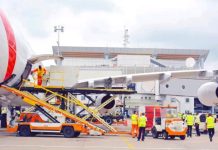The Nigerian aviation industry is bracing for major disruptions as Air Peace, the country’s largest airline, suspended all flight operations nationwide due to an indefinite strike by the staff of the Nigerian Meteorological Agency (NiMet). Several foreign airlines, including British Airways and Qatar Airways, have also grounded operations to Nigeria, citing flight safety concerns.
The strike, which commenced at 12:00 a.m. on Tuesday, has led to flight delays and cancellations across several airports including Nnamdi Azikiwe International Airport (Abuja), Malam Aminu Kano International Airport (Kano), Port Harcourt International Airport, Minna, and Asaba. Reports indicate that NiMet offices across all 56 synoptic stations—covering agro, marine, and aeronautical services—have also shut down.
Air Peace, which operates over 120 daily flights and accounts for more than 50% of domestic air traffic, stated that the decision to halt operations was driven by safety concerns. The airline emphasized that NiMet’s Current Nowcast of Hazardous (CNH) weather reports are vital for safe take-offs and landings, particularly during the ongoing season of heavy rainfall and thunderstorms.
Without real-time weather reports, flight safety cannot be guaranteed, prompting the suspension until NiMet resumes full service.
Other domestic carriers such as Overland Airways also experienced disruptions, while one unnamed airline was forced to make an air return from Port Harcourt to Lagos. Some international carriers have parked their aircraft, in compliance with global aviation safety protocols, while expressing dismay at the continued operation of some local airlines despite safety concerns.
The strike is being spearheaded by three aviation unions: the National Union of Air Transport Employees (NUATE), the Amalgamated Union of Public Corporations, Civil Service Technical and Recreational Services Employees (AUPCTRE), and the Association of Nigeria Aviation Professionals (ANAP).
The unions accuse NiMet’s management of reneging on a partial agreement reached on January 29, 2025, which aimed to address longstanding issues surrounding poor remuneration and inadequate working conditions.
Union representatives lamented that despite rendering critical meteorological services to various sectors—aviation, agriculture, and marine—NiMet workers remain underpaid and overworked. Workers also cited disparities in salaries compared to sister agencies and raised concerns about deteriorating health conditions and the financial strain of basic living expenses.
The Federal Government is reportedly making urgent efforts to resolve the situation. Minister of Aviation and Aerospace Development, Mr. Festus Keyamo, has called for a reconciliation meeting involving NiMet management and union leaders at his Abuja office. Sources within the ministry expressed optimism that a truce might be reached soon.
Dr. Ibrahim Kana, the Permanent Secretary of the Ministry, is also involved in ongoing negotiations. However, as of Wednesday, no agreement had been reached.
A source from NiMet management expressed disappointment over the unions’ decision to proceed with the strike, claiming that 70% of their demands had been addressed and that the remaining issues were awaiting government approval.
The source also questioned the motives behind the strike, suggesting that external influence might be responsible for the disruption despite earlier acknowledgments of management’s cooperative stance.
There are fears the situation could escalate if other aviation groups, including Air Traffic Controllers (ATCs), join in solidarity. The unions have warned that failure to meet their demands could paralyze the entire aviation sector, both domestically and internationally.
Meanwhile, anxiety grows among passengers and stakeholders. Travelers at major airports like Abuja and Lagos are uncertain about their travel plans, hoping for a swift government resolution.
As the strike continues, the aviation industry stands to lose billions of naira daily from ticket sales, Passenger Service Charges (PSC), ground handling fees, and other revenue streams affecting airlines, support services, and regulatory bodies such as the Federal Airports Authority of Nigeria (FAAN) and the Nigeria Civil Aviation Authority (NCAA).
The coming days will be crucial as the nation watches to see if negotiations will bring an end to the strike or deepen the crisis in Nigeria’s already fragile aviation sector.













